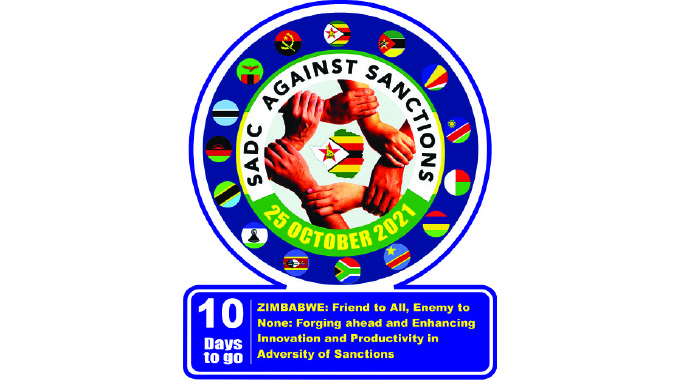19 years on, Zim’s health sector can’t breathe

Pardon Muzavazi-Correspondent
This year’s anti sanctions day will be heralded by the United Nations’ Special Rapporteur’s visit to Zimbabwe. Dr Alena Douhan is coming to Zimbabwe to assess the impact of sanctions on Human Rights.
It’s a welcome move for the UN Rapporteur to visit Zimbabwe and see for herself how much damage the sanctions have inflicted on the people of Zimbabwe.
The visit will debunk the West’s narrative that the sanctions are selective. Sanctions have become a channel for human rights violations impacting negatively on the lives and livelihoods of all Zimbabweans.
The United States, United Kingdom, and the European Union (EU) teamed up to impose illegal sanctions on Zimbabwe without the approval of the United Nations Security Council.
The sanctions solidarity are a reflection of a brotherhood of the West, who came together to support the UK that squirmed as a result of the land reform programme that Zimbabwe undertook in 2002, to resettle people in fertile and arable lands. The land redistribution program saw a number of white farmers lose part of their vast hectares of land to the majority of black Zimbabweans.
One of the sectors that have not been breathing because of the sanctions is the health sector.
Due to the illegal sanctions, Zimbabwe lost lives, livelihoods and the ability to maintain its health facilities and human resources.
This has resulted in the sector suffering significant brain drain as nurses and doctors in the health sector left the country to seek greener pastures.
The Government was unable to pay competitive salaries to its health workers due to restrained finances since the UK and its allies had withdrawn funding.
In 2001, DANIDA withdrew aid funding towards various vertical health programs to the tune of US$29,7 million.
The Canadian International Development Agency pulled out of Zimbabwe in 2003, terminating all projects and retrenching its workforce.
The World Health Organisation (WHO) relocated its regional offices from Zimbabwe to Congo Brazzaville. This was accompanied by retrenchment of numerous Zimbabweans who were formerly employed by WHO.
Also, the World Bank loan facility was also halted soon after the imposition of sanctions, leaving unfinished health projects hanging, while Zimbabwe’s grant application for funding for its HIV/AIDS programs to the Global Fund was rejected on political grounds.
These are not isolated incidents as a number of other Non-Governmental Organisations (NGOs) and international cooperating partners also moved their operations out of Zimbabwe due to the sanctions that demanded they fold or risk being embargoed.
Dr Douhan is best placed to make an assessment of the effects of sanctions on the enjoyment of human rights in Zimbabwe. Everyone has a right to health, to life and access to clean water and sanitation.
According to the UN Charter on Human Rights, the right to health must be enjoyed without discrimination on the grounds of race, age, ethnicity or any other status. Non-discrimination and equality requires states to take steps to redress any discriminatory law, practice or policy.
Through the anti-sanctions campaign on October 25, Zimbabwe and SADC countries are taking steps to ensure that Zimbabweans can access quality healthcare, by coming together to denounce the very roots of this suffering, sanctions.
The Government has failed to import hospital equipment, machines and medicines due to the sanctions, leaving the country with obsolete equipment that cannot be applied to modern day science.
There is need for urgent removal of sanctions on Zimbabwe as they continue to cripple Government efforts to adequately provide internationally acceptable standards of healthcare, water and sanitation.
Water and sanitation infrastructure have broken down though Government tries to maintain them. The effects of sanctions have ominously hindered those efforts through embargoes.
Government is therefore left with no choice but to use materials that are not durable and are short lived, which has resulted in collapsed infrastructure.
The resultant effect has been that of constrained capacity to provide adequate clean and safe water to communities.
Water treatment plants have not been upgraded to match increased demand, resulting in the outbreak of Cholera and Typhoid.
Article 25 of the 1948 Universal Declaration of Human Rights cited health as part of the right to an acceptable standard of living. The States Parties to the present Covenant recognise the right of everyone to the enjoyment of the highest attainable standard of physical and mental health.
According to this, Zimbabwe has been short-changed by sanctions, hence its people have suffered a lot of physical and mental health.
Looking at it, one is forced to think that perhaps the sanctions on Zimbabwe are part of a bigger picture by the former colonial powers to continue keeping Africa under a very short leash.
The drive has been to satisfy an insatiable desire for Africa’s wealth in resources.
Strive Masiyiwa who is the African Union special envoy tasked with leading efforts to procure Covid-19 vaccines, termed the shortage of vaccines in Africa as a deliberate action by the West to control Africa, bringing it to its knees until it gets to a point where it’s at the mercy of the West.
Africa has some of the best brains in the world that are capable of getting into the lab and creating own vaccines, but the West keeps a lock and key on who can be certified to produce Covid-19 vaccines.
Meanwhile, to show the twisted efforts by the West to disadvantage Africa, it has denied it a production facility and at the same time it has not equally distributed vaccines across the globe, Africa has been disadvantaged and left out.
By the first quarter of this year, the US had managed to vaccinate 45 percent of its population, UK 47 percent, EU 29 percent while Africa had about 61,4 million doses delivered for 1,16 billion only able to vaccinate 11 percent of Africa. In retrospect, Africa is but mining ground for the West, it envisions a future where Africa is fully re-colonised, one way or the other.









Comments